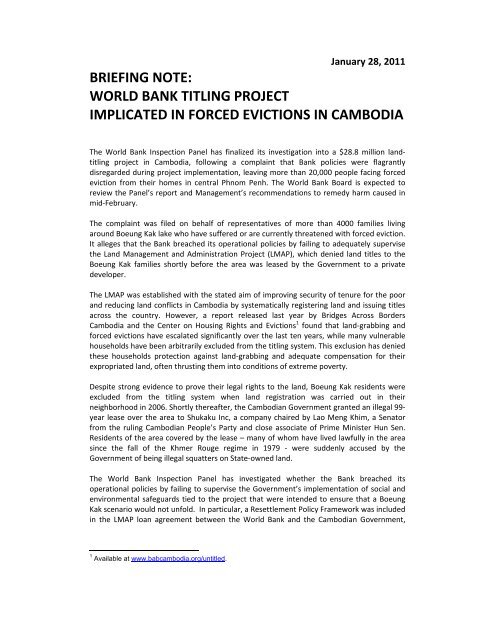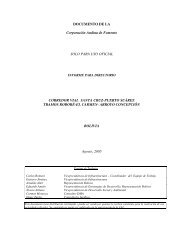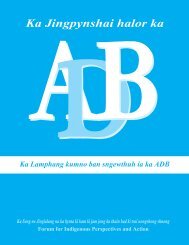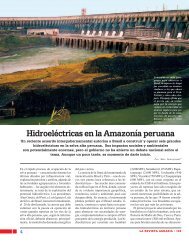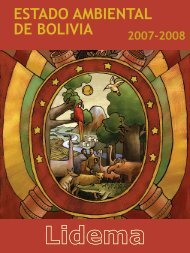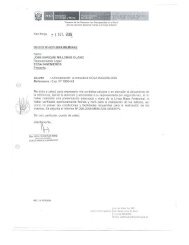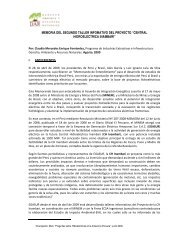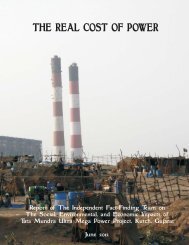briefing note - Bank Information Center
briefing note - Bank Information Center
briefing note - Bank Information Center
You also want an ePaper? Increase the reach of your titles
YUMPU automatically turns print PDFs into web optimized ePapers that Google loves.
January 28, 2011BRIEFING NOTE:WORLD BANK TITLING PROJECTIMPLICATED IN FORCED EVICTIONS IN CAMBODIAThe World <strong>Bank</strong> Inspection Panel has finalized its investigation into a $28.8 million landtitlingproject in Cambodia, following a complaint that <strong>Bank</strong> policies were flagrantlydisregarded during project implementation, leaving more than 20,000 people facing forcedeviction from their homes in central Phnom Penh. The World <strong>Bank</strong> Board is expected toreview the Panel’s report and Management’s recommendations to remedy harm caused inmid‐February.The complaint was filed on behalf of representatives of more than 4000 families livingaround Boeung Kak lake who have suffered or are currently threatened with forced eviction.It alleges that the <strong>Bank</strong> breached its operational policies by failing to adequately supervisethe Land Management and Administration Project (LMAP), which denied land titles to theBoeung Kak families shortly before the area was leased by the Government to a privatedeveloper.The LMAP was established with the stated aim of improving security of tenure for the poorand reducing land conflicts in Cambodia by systematically registering land and issuing titlesacross the country. However, a report released last year by Bridges Across BordersCambodia and the <strong>Center</strong> on Housing Rights and Evictions 1 found that land‐grabbing andforced evictions have escalated significantly over the last ten years, while many vulnerablehouseholds have been arbitrarily excluded from the titling system. This exclusion has deniedthese households protection against land‐grabbing and adequate compensation for theirexpropriated land, often thrusting them into conditions of extreme poverty.Despite strong evidence to prove their legal rights to the land, Boeung Kak residents wereexcluded from the titling system when land registration was carried out in theirneighborhood in 2006. Shortly thereafter, the Cambodian Government granted an illegal 99‐year lease over the area to Shukaku Inc, a company chaired by Lao Meng Khim, a Senatorfrom the ruling Cambodian People’s Party and close associate of Prime Minister Hun Sen.Residents of the area covered by the lease – many of whom have lived lawfully in the areasince the fall of the Khmer Rouge regime in 1979 ‐ were suddenly accused by theGovernment of being illegal squatters on State‐owned land.The World <strong>Bank</strong> Inspection Panel has investigated whether the <strong>Bank</strong> breached itsoperational policies by failing to supervise the Government’s implementation of social andenvironmental safeguards tied to the project that were intended to ensure that a BoeungKak scenario would not unfold. In particular, a Resettlement Policy Framework was includedin the LMAP loan agreement between the World <strong>Bank</strong> and the Cambodian Government,1 Available at www.babcambodia.org/untitled.
which established a fair process for resettlement and compensation of people found to beresiding on State land.The World <strong>Bank</strong> acknowledged in August 2009 that the Involuntary Resettlement safeguardshad been breached and approached the Cambodian Government to discuss measures tobring the project back into compliance. The Government responded by abruptly ending itsagreement with the World <strong>Bank</strong> on LMAP, citing the <strong>Bank</strong>’s “complicated conditions” as thereason for its move. Since that time, the Cambodian Government has rebuffed all World<strong>Bank</strong> attempts to remedy the situation and forced evictions in the Boueng Kak area havecontinued unabated.The Requesters and Cambodian and international rights groups are calling upon the World<strong>Bank</strong> to suspend concessional lending to the Cambodian Government until such time as theGovernment is no longer in default of its contractual obligations vis‐à‐vis LMAP. At aminimum, this would require the Government to cooperate with the World <strong>Bank</strong> inimplementing measures to address the harms suffered by Boeung Kak residents.In a recent letter, Boeung Kak community representatives appealed to President Zoellick totake serious action to hold the Cambodian Government accountable:If the Government continues to refuse to cooperate with the World <strong>Bank</strong> to redressthe harm that we have suffered, then we call upon you to suspend your loans andgrants to Cambodia until the Government is prepared to respect our rights andWorld <strong>Bank</strong> policies. We call for accountability, not just for our Boeung Kakcommunity, but for all the people suffering from land‐grabbing and forced evictionsthroughout Cambodia.It is <strong>note</strong>worthy that the World <strong>Bank</strong> was implicated in forced evictions in a similar case inAlbania in 2009. Following a damning report by the Inspectional Panel, World <strong>Bank</strong> PresidentRobert Zoellick declared that "the <strong>Bank</strong> would move promptly to strengthen oversight,improve procedures and help the [affected] families." Zoellick added: "The <strong>Bank</strong> cannot letthis happen again." If the <strong>Bank</strong> fails to act decisively in the case at hand, then thePresident’s words will ring hollow.Homes of Boeung Kak’s Village 1 residents submerged in mud by “developer” Shukaku Inc. inNovember 2010. These households were unfairly excluded from the World <strong>Bank</strong>‐funded land‐titlingproject in 2007, paving the way for their forced eviction three years later.
Background on Boeung Kak caseSpanning 90 hectares in central north Phnom Penh, Boeung Kak lake was one of the onlylarge open spaces left in Cambodia’s capital city. Prior to the recent evictions,approximately 4000 families lived on and around the lake with many depending on the lakefor their livelihood. Families have been living around the lake since the early 1980s, whenthey returned to the city following the fall of the Khmer Rouge regime. Most of thesefamilies have legal rights to their land under Cambodia’s 2001 Land Law.Despite the legitimate claims to the land of many of the residents around Boeung Kak, whenthe titling team from the World <strong>Bank</strong>‐financed Land Management and AdministrationProject (LMAP) adjudicated the area in early 2007, the residents were denied title en masse.In the same month, the Cambodian government entered into a 99‐year lease agreementwith a private developer, Shukaku Inc., over 133 hectares including the lake and surroundingareas. Shukaku Inc. is headed by Lao Meng Khin, a Senator and major donor to the rulingCambodian People’s Party.Families living in the development zone began facing pressure and intimidation to leave thearea in August 2008, when the developer commenced filling in the lake as part of itsdevelopment plans. While few details about the development have been made public, it isestimated that approximately 20,000 people will be displaced. Included in this figure are themore than 1500 families that have already been evicted without their land rights beingproperly adjudicated and acknowledged. In the absence of any legal protections, thesefamilies accepted inadequate compensation under conditions of duress. This was in directviolation of the World <strong>Bank</strong>’s Policy on Involuntary Resettlement, which the Cambodiangovernment was contractually bound to respect in conjunction with LMAP.Due to the sand filling, water levels in the remainder of lake rose significantly during therainy season, reaching critical levels in August and inundating more than 1000 residents’homes with sewage‐contaminated water. Residents had to wade through knee and hiphigh,unsanitary water to reach their homes, while others were forced to seek shelterelsewhere as their homes were uninhabitable due to the flooding. Residents and local rightsgroups believe that the continued pumping of sand into the lake, and the inefficientdrainage measures, indicate that the flooding is a deliberate measure to increase pressureon residents to move away from the area.Since September 2010, Shukaku has pointed its sand‐pumping machine directly at thehomes of residents of one Boeung Kak village, deluging them with mud and forcing familiesto evacuate their homes. Dozens of homes and tracts of private land have been buried inthe sand, with their owners offered only a small fraction of their property values incompensation. Some 27 families in this village have been denied any compensationwhatsoever. Another 18 families residing in two other villagers were provided one‐weeknotice to demolish their homes to make way for an access road and were forced to accept asmall plot of land outside the city and merely USD $500 as compensation.Protests by the residents have been met with threats and excessive force by the authorities.During one incident that took place on October 28 th , when a group of peaceful protestersgathered to seek the intervention of UN Secretary‐General Ban Ki Moon who was visitingCambodia, anti‐riot police launched a violent assault on the protesters, beating them to theground and shocking people with electric batons. One activist, Suong Sophorn, was arrestedand viciously beaten, resulting in a severe wound to the head.
Complaint to the World <strong>Bank</strong> Inspection Panel and Management ResponseThe Request for Inspection was submitted by the Centre on Housing Rights and Evictions(COHRE), on behalf of Boeung Kak residents, in September 2009. After finding that thecomplaint was eligible, the Inspection Panel conducted its investigation between November2009 and November 2010.In response to the Request for Inspection, World <strong>Bank</strong> Management acknowledged“significant shortcomings in past Project implementation and supervision.” It also concededthat “supervision of safeguards and other social measures should have been more robust”and that, in its view, the LMAP Resettlement Policy Framework (RPF) should have indeedbeen triggered in the Boeung Kak case.Accordingly, <strong>Bank</strong> Management made a number of commitments to attempt to addressharms suffered. Specifically, it committed to “[w]orking with the Government andDevelopment Partners towards ensuring that the communities who filed the Request will besupported in a way consistent with the Resettlement Policy Framework.” Further,Management pledged to “continue to pursue actions so that people can benefit from a setof protection measures in line with what they would have received under the RPF,” includingthe possibility of using other World <strong>Bank</strong> credits or trust fund mechanisms. Managementalso stated that it would “encourage the Government to act on environmental concerns inthe BKL area.”In March 2010, the <strong>Bank</strong> attempted to initiate a feasibility study with the Government on anew project aimed at improving living conditions for the Requesters and other resettled andurban poor households. However, the Government rejected this project and further <strong>Bank</strong>offers of assistance.The remaining residents have since proposed a land‐sharing and in situ resettlement plan onless than 12% of the leased area. They have asked for the World <strong>Bank</strong>’s support for thisplan, which would prevent further forced evictions and impoverishment of affected familiesin line with the requirements of the RPF. They have also called upon the <strong>Bank</strong> to establish atrust fund to be administered by a non‐governmental agency to provide assistance forlivelihood restoration to families who have already been evicted.In January 2011, the Requesters and rights organizations met again with <strong>Bank</strong> Managementto discuss the <strong>Bank</strong>’s efforts to implement the action plan described in its Response to theRequest for Inspection, as well as its response to the Inspection Panel report. <strong>Bank</strong> officialsindicated that despite the <strong>Bank</strong>’s efforts, there had been no progress in implementing theplan and that the Cambodian Government remained opposed to any World <strong>Bank</strong>involvement in this issue. The officials reiterated that the <strong>Bank</strong> could not take any remedialaction without a willing partner in the Cambodian Government.The Request for Inspection, Management Response and Eligibility Report is available on theWorld <strong>Bank</strong> Inspection Panel website at:http://web.worldbank.org/WBSITE/EXTERNAL/EXTINSPECTIONPANEL/0,,contentMDK:22326773~menuPK:64129250~pagePK:64129751~piPK:64128378~theSitePK:380794~isCURL:Y,00.html


